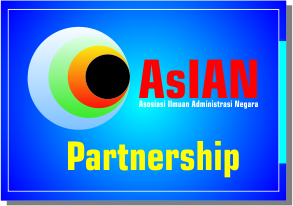Dilema Pelimpahan Wewenang Walikota dalam Pelaksanaan Pelayanan Terpadu Kecamatan (PATEN) di Kota
DOI:
https://doi.org/10.31334/trans.v1i2.307Keywords:
Delegation of Authority, Integrated Services, Districts, Licensing Services, InnovationAbstract
Regional autonomy provides broad and tangible authority to local governments to carry out public services. Acceleration of improving service quality requires creativity and innovation so that services can be carried out effectively and efficiently. The government wants public services to be closer to the community, so that the sub-district becomes the spearhead of services provided by the regional government. A set of regulations issued by the government that gives authority to the sub-district to carry out licensing and non-licensing services. One of the policies issued is the integrated sub-district administrative service (PATEN), this policy is reinforced by the issuance of Bandung City Regulation No. 185/2015 concerning the delegation of mayor's authority to the sub-district and village heads. PATENT policy requires the sub-district as a node of one-stop integrated services. In practice, there is a dilemma in delegating the authority of the mayor to the sub-district head regarding the implementation of PATENT in the city of Bandung.
Some of the factors that inhibit the implementation of the PATENT include the limits of authority delegated to the sub-district head in the licensing service is unclear, there are different interpretations that the sub-district does not need to provide licensing services because Bandung has BPMPTSP besides geographically not too large so that service institutions it can be reached by the community, there is no incentive / disincentive for the region to implement or not implement integrated administrative services in the sub-district, the sub-district institutional capacity, especially the availability and competency of human resources that are not sufficient to carry out delegated service authority. Suggestions that can be conveyed regarding the implementation of the PATENT policy, must be considered that the delegation of authority should consider the typology of sub-districts based on the scale, type of service, impact and level of responsibility of the services provided.
References
Arnaboldi, Michela, et.al. (2015). Performance Management in The Public Sector: The Ultimate Challenge. Journal of Financial Accountability and Management. Volume 31 (1), pg. 1-22
Mardani, Moh. Iskandar. (2011). Pelimpahan Kewenangan Bupati Dalam Otonomi Daerah (Kajian Pelimpahan Kewenangan Delegatif Bupati Kepada Camat di Kabupaten Parigi Moutong Propinsi Sulawesi Tengah). Jurnal Academica. Fisip Untad Volume 03 (1), hal. 547-563
Moenir, A.S. (1995). Manajemen Pelayanan Umum Indonesia. Bumi Aksara. Jakarta.
Moleong, Lexy J. (2005). Metodologi Penelitian Kualitatif. Bandung : PT. Remaja Rosdakarya
Ochojski, Artur, dan Marcin Baron. (2015). Innovation In Public Services: The Pursuit Of Economic Drivers. Journal of Economic and Management, Volume 19 (1), pg.173-180
Ratminto , Winarsih. (2007). Manajemen Pelayanan. Jakarta: Pustaka Pelajar
Undang-Undang Nomor 25 Tahun 2009 Tentang Pelayanan Publik.
Undang-Undang Nomor 23 Tahun 2014 Tentang Pemerintah Daerah
Peraturan Presiden Nomor 98 Tahun 2014 tentang Perijinan Tentang Usaha Mikro dan Kecil
Peraturan Menteri Dalam Negeri Nomor 4 Tahun 2004 Tentang Pedoman Pelayanan administrasi Terpadu Kecamatan (PATEN).
Permendagri Nomor 24 Tahun 2006 tentang Pedoman Penyelenggaraan Pelayanan Terpadu Satu Pintu.
Peraturan Daerah Kota Bandung Nomor 06 Tahun 2008 Tentang perubahan Atas Peraturan Daerah Kota Bandung Nomor 06 Tahun 2006 Tentang Pemekaran dan Pembentukan Wilayah Kerja Kecamatan Dan Kelurahan di Lingkungan Pemerintah Kota Bandung.
Peraturan Daerah Kota Bandung Nomor 18 Tahun 2011 tentang RTRW Kota Bandung Tahun 2011-2031.
Peraturan Walikota Bandung Nomor 185 Tahun 2015 tentang Pelimpahan Kewenangan Walikota Kepada Camat dan Lurah.
Downloads
Published
Issue
Section
License

This work is licensed under a Creative Commons Attribution-ShareAlike 4.0 International License
Please find the rights and licenses in Transparansi : Jurnal Ilmiah Ilmu Administrasi By submitting the article/manuscript of the article, the author(s) agree with this policy. No specific document sign-off is required.
- License
The commercial use of the article will be governed by the Creative Commons Attribution license as currently displayed on Creative Commons Attribution-ShareAlike 4.0 International License.
2. Author(s)' Warranties
The author warrants that the article is original, written by stated author(s), has not been published before, contains no unlawful statements, does not infringe the rights of others, is subject to copyright that is vested exclusively in the author and free of any third party rights, and that any necessary written permissions to quote from other sources have been obtained by the author(s).
3. User Rights
Transparansi : Jurnal Ilmiah Ilmu Administrasi spirit is to disseminate articles published are as free as possible. Under the Creative Commons license, Transparansi : Jurnal Ilmiah Ilmu Administrasi permits users to copy, distribute, display, and perform the work for non-commercial purposes only. Users will also need to attribute authors and Transparansi : Jurnal Ilmiah Ilmu Administrasi on distributing works in the journal and other media of publications.
4. Co-Authorship
If the article was jointly prepared by more than one author, any authors submitting the manuscript warrants that he/she has been authorized by all co-authors to be agreed on this copyright and license notice (agreement) on their behalf, and agrees to inform his/her co-authors of the terms of this policy. Transparansi : Jurnal Ilmiah Ilmu Administrasi will not be held liable for anything that may arise due to the author(s) internal dispute. Transparansi : Jurnal Ilmiah Ilmu Administrasi will only communicate with the corresponding author.
5. Miscellaneous
Transparansi : Jurnal Ilmiah Ilmu Administrasi will publish the article (or have it published) in the journal if the article’s editorial process is successfully completed. Transparansi : Jurnal Ilmiah Ilmu Administrasi editors may modify the article to a style of punctuation, spelling, capitalization, referencing and usage that deems appropriate. The author acknowledges that the article may be published so that it will be publicly accessible and such access will be free of charge for the readers as mentioned in point 3.
Every accepted manuscript should be accompanied by "Copyright Transfer Agreement"prior to the article publication.











